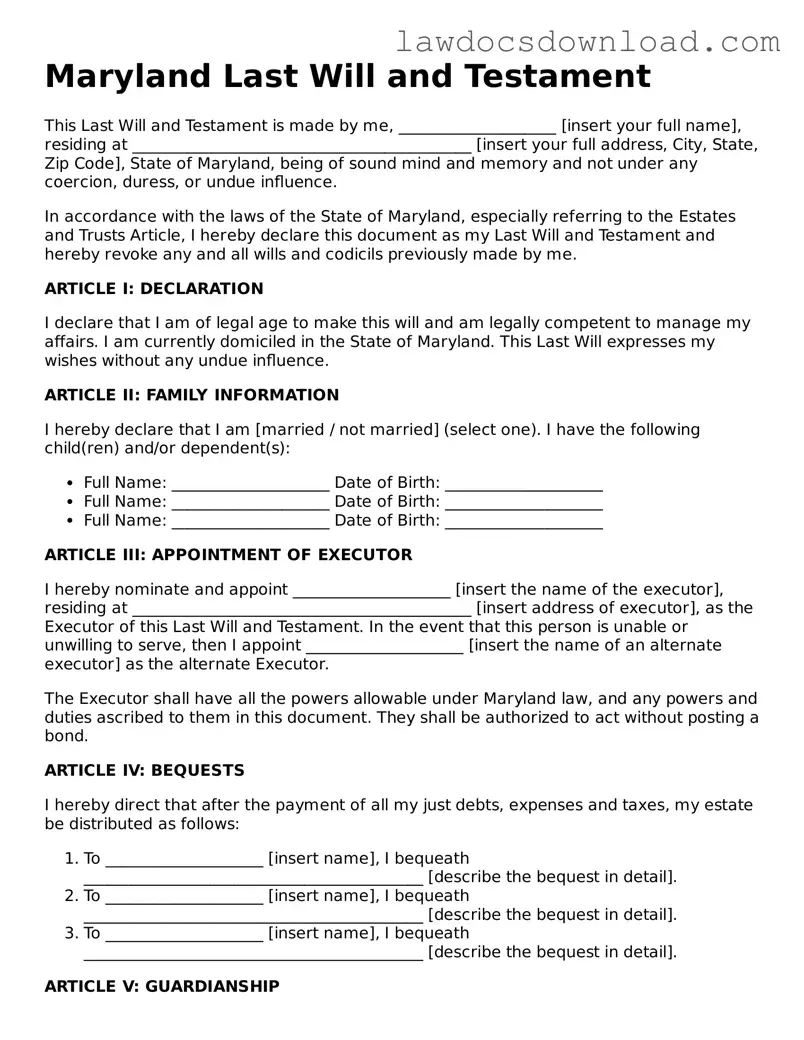Maryland Last Will and Testament
This Last Will and Testament is made by me, ____________________ [insert your full name], residing at ___________________________________________ [insert your full address, City, State, Zip Code], State of Maryland, being of sound mind and memory and not under any coercion, duress, or undue influence.
In accordance with the laws of the State of Maryland, especially referring to the Estates and Trusts Article, I hereby declare this document as my Last Will and Testament and hereby revoke any and all wills and codicils previously made by me.
ARTICLE I: DECLARATION
I declare that I am of legal age to make this will and am legally competent to manage my affairs. I am currently domiciled in the State of Maryland. This Last Will expresses my wishes without any undue influence.
ARTICLE II: FAMILY INFORMATION
I hereby declare that I am [married / not married] (select one). I have the following child(ren) and/or dependent(s):
- Full Name: ____________________ Date of Birth: ____________________
- Full Name: ____________________ Date of Birth: ____________________
- Full Name: ____________________ Date of Birth: ____________________
ARTICLE III: APPOINTMENT OF EXECUTOR
I hereby nominate and appoint ____________________ [insert the name of the executor], residing at ___________________________________________ [insert address of executor], as the Executor of this Last Will and Testament. In the event that this person is unable or unwilling to serve, then I appoint ____________________ [insert the name of an alternate executor] as the alternate Executor.
The Executor shall have all the powers allowable under Maryland law, and any powers and duties ascribed to them in this document. They shall be authorized to act without posting a bond.
ARTICLE IV: BEQUESTS
I hereby direct that after the payment of all my just debts, expenses and taxes, my estate be distributed as follows:
- To ____________________ [insert name], I bequeath ___________________________________________ [describe the bequest in detail].
- To ____________________ [insert name], I bequeath ___________________________________________ [describe the bequest in detail].
- To ____________________ [insert name], I bequeath ___________________________________________ [describe the bequest in detail].
ARTICLE V: GUARDIANSHIP
In the event that I am the parent or legal guardian of minor children at the time of my death, I hereby appoint ____________________ [insert the name of the guardian], residing at ___________________________________________ [insert address of guardian], as guardian of said minor children. Should the aforementioned person be unable or unwilling to serve as guardian, I appoint ____________________ [insert the name of an alternate guardian] as the alternate guardian.
This appointment is made with the understanding that it will take effect only if there is no surviving parent to take custody of the minor children at the time of my death.
ARTICLE VI: OTHER MATTERS
Any other matters not expressly covered in this Last Will and Testament shall be managed by my Executor in a manner they deem to be in the best interest of my estate, under the guidance and limitations set by the law of the State of Maryland.
This Last Will and Testament was executed by me on this ______ day of _______________ [month], ______ [year].
__________________________________
[Signature]
__________________________________
[Printed Name]
WITNESS DECLARATION
This Last Will and Testament was declared by ____________________ [name of the testator] as his/her Last Will and Testament in our presence, and we, in the presence of the testator and each other, hereby subscribe our names as witnesses on this ______ day of _______________ [month], ______ [year]. The testator appears to be of sound mind and not under duress, fraud, or undue influence.
Witness #1:
__________________________________
[Signature]
__________________________________
[Printed Name]
Address: ________________________________________________________
Witness #2:
__________________________________
[Signature]
__________________________________
[Printed Name]
Address: ________________________________________________________

